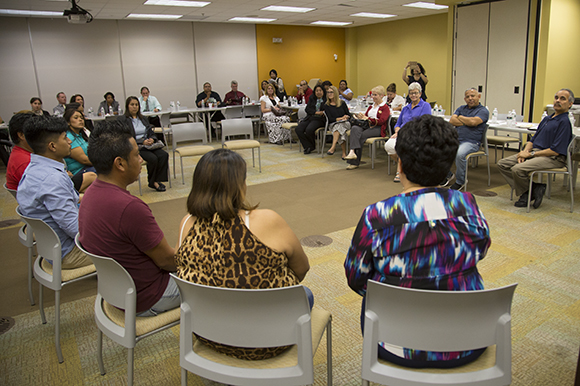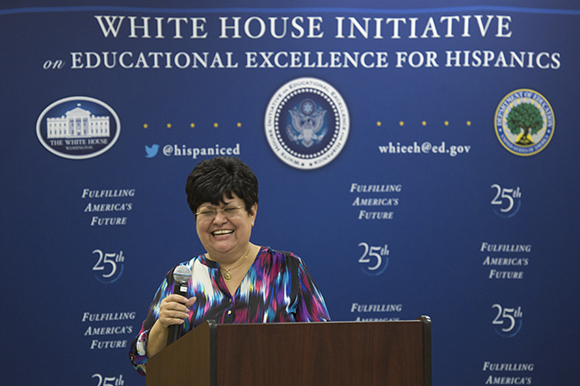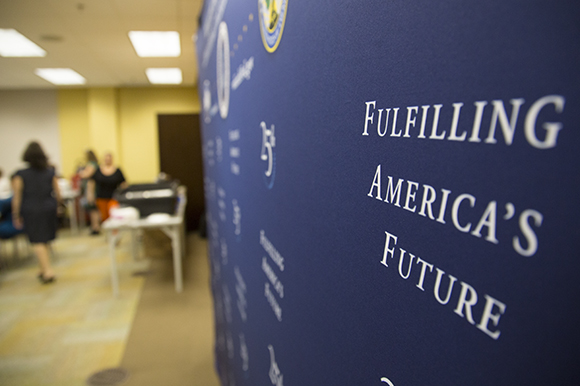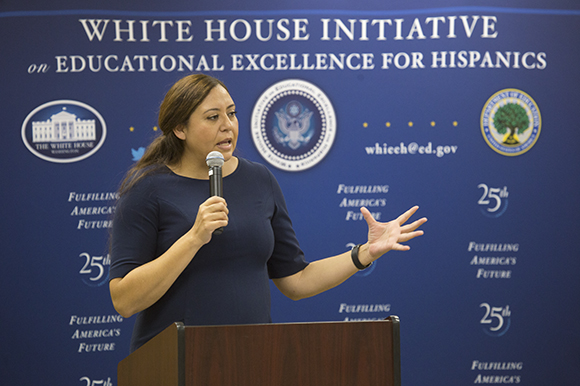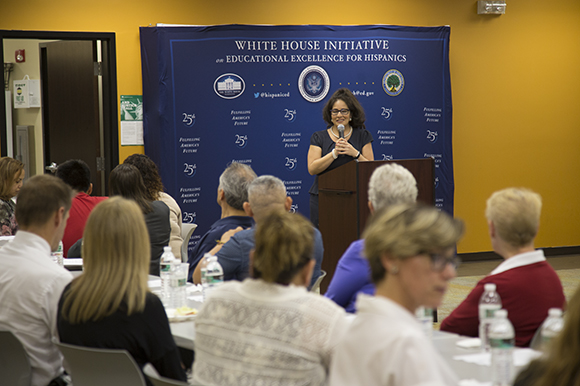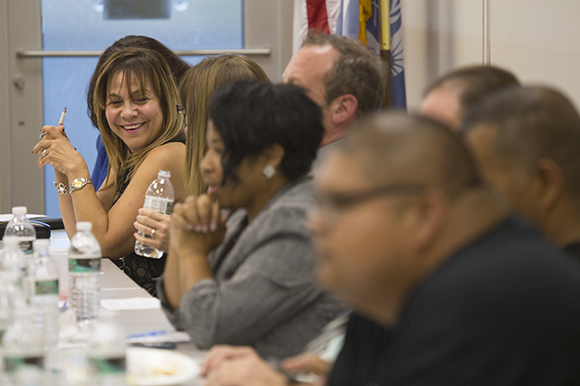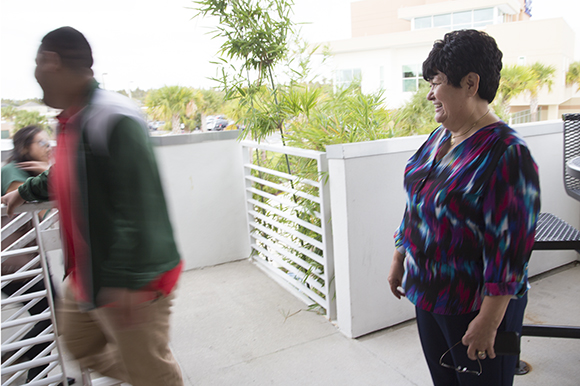Migrant families face familiar hardships in schools
A national White House initiative arrives in Hillsborough County to learn more about the special challenges migrant families face in trying to access education for their children.
To read this story in Spanish, please follow this link.
Cipriano Mejía listened attentively to the discussion between educators and parents in the fourth meeting of the series Raising Migrant Voices, and took note of the disparity still existent in services available for children of migrant workers and their parents in the Hillsborough County public school system.
Redlands Christian Migrant Association (RCMA) hosted the forums sponsored by the White House Initiative on Educational Excellence for Hispanics in Ruskin and Dover last week that brought parents, students, educators and agricultural business owners together to discuss the needs confronting migrant families in the education system.
The forums provided an opportunity for migrant parents to talk about the challenges they face when they try to talk with school principals and administrators. Anecdotes included an indifferent attitude by an administrative assistant who denies them access to the principal, sometimes by making them wait for hours. And language barriers they confront when no one at the schools is available who can communicate with the parents in Spanish.
“I believe we have before us a language barrier problem and a prevailing need to provide cultural training for teachers, so that they may understand our children and can help them improve their performance,” Mejía said.
Mejia, 30, lives in Wimauma with his family and is an ambassador for Opening Doors, a parent leadership training program implemented by RCMA to empower parents to become involved in their children’s education.
Mejía believes there is much left to be done to resolve the core educational barriers agricultural workers face.
“We not only serve the students, but we also serve their families. And the step that is needed is for migrant education programs to align with reality,” said Barbara Mainster, Executive Director of RCMA.
Mainster emphasized the need for greater local control of the programs and a focus on training teachers, specifically, on assimilation into a foreign culture.
Lourdes Villanueva, Director of Farmworker Advocacy for RCMA, agreed with Mejía. Models in which parents are an integral part of the educational process and in which they carry a decisive weight over what will and will not be done needs to be instituted, she said. Traditionally, migrant families have been pushed into the background in the public school system as a result of language and cultural barriers.
“Listening to parents is necessary, training parents is necessary and providing them with leadership tools is necessary, so that they can participate in the educational process of their children,” Villanueva said, adding that migrant advocates should not have to do work beyond what is included in their job description, such as having to deal with discipline problems — a job that corresponds to what teachers face. Therefore, better defining roles is also necessary.
Greatest challenges for students, parents
During the meeting, parents reported that some of the greatest barriers facing migrant students in Ruskin and Dover public schools include bullying, cultural barriers as a result of having monolingual teachers, a very small number of bilingual workers available and a lack of access to school principals to initiate conversations with parents about the progress or challenges facing their children in school.
Parents shared their experiences in public schools from Wimauma and Ruskin to Dover and Plant City — where migrant children have been victimized for not wearing brand-name clothing by their classmates or been made a laughingstock simply because their parents work in the fields.
They also complained that teachers are inclined to focus on their children’s shortcomings instead of providing positive reinforcement for their good behaviors.
One of the mothers, Aurora Lopez, expressed her frustration at only hearing “bad and negative” things about her daughter from her primary school teacher in Ruskin.
Mejía added, “My daughter used to come home complaining that the other kids made fun of her because she didn’t wear brand-name clothing.”
Some schools have already made school uniforms mandatory in order to address this situation. Javier Hernandez, one of the fathers, said that since school uniforms became mandatory at his child’s school in Ruskin, they have experienced a 360-degree turn. The children express they feel more united and with a greater sense of identity now, he said.
After listening to the unpleasant experiences migrant parents are facing in the public school system, Cleo Rodriguez, Jr., Executive Director of the National Migrant & Seasonal Head Start Association, said, “We can’t argue against this. These are parents’ perceptions.” He urged a collaborative effort be undertaken to end bullying in the schools, and to bridge language and cultural barriers that are a hindrance to migrant communities.
Villanueva expressed her disillusionment with the problems afflicting the children of agricultural workers and said that there has been absolutely no change in the past 30 years.
“I’m very sad that we haven’t made much progress. Truly, all remains the same as it was 30 years ago,” she said. “I suffered the same things these families are confronting now. They also had me wait for hours for an answer when I used to go school to intercede for my children.”
Nevertheless, she expressed satisfaction with the interest the migrant association and the White House are taking in searching for solutions to the problems in education facing migrant families. She hopes there will be follow-up to the challenges presented at the forums.
“I hope these talks will be considered and taken seriously, and that there will be some follow-up,” she said. “That we commit to work side-by-side to improve the situation for all children, but specifically for migrant families,” Villanueva added.
Villanueva hopes the group, which came from Washington D.C. to listen to the educational needs in Florida, will inspire decisions that will result in change and not just end up in a report.
School leaders look for solutions
Carol Mayo, Migrant Education Services Supervisor for Hillsborough Public Schools, was among the educational administrators at the meeting. She expressed her discontent with the negative experiences of migrant families in the public schools.
“There is no excuse to justify what is happening and it shouldn’t be happening,” she said.
Mayo offered to take measures aimed at resolving the barriers facing families in the public schools, such as the language barrier.
“I have a group of leaders in the east side of the county and we are now creating one in the south side of the county,” she said.
“We are basically teaching parents how to be their child’s advocate, we teach them everything about the school system; who to address to resolve the problems they’re facing in the school system, and we take them to a district school board meeting. We just hired someone to lead the efforts, to contact parents and start making appointments to get the group organized,” Mayo explained.
The idea is for a representative from each school to participate in the group to discuss and resolve the problems confronting migrant parents in the schools.
“My goal with the leadership groups is to provide an opportunity for school principals to be able to reach migrant parents and resolve these problems,” Mayo said.
Alejandra Ceja, executive director of the White House Initiative on Educational Excellence for Hispanics, explained that meetings like the ones in Florida have been held all across the nation with a focus on agricultural workers.
“It’s been a good opportunity to hear from parents about what is working and what challenges they are facing, and more importantly having the school district representatives there to answer how we can work together,” she said.
At the end of the day, the meetings in Florida resulted in similar findings to those across the nation.
“We have to invest in Hispanic students, in educating parents to get more involved, and to work together as a community. We can’t do it alone,” Ceja said.
For now, Ceja said the White House initiative will be working on putting together a report that includes recommendations for the next administration. The report will emphasize common problems related to culture, language and bullying. The report will be ready in December.
Delia Garcia, Senior Liaison for the Latino American Community within the National Education Association, took note of parents’ experiences and spoke of her commitment to working together to obtain better results in the educational process.
Villanueva encouraged actions that will result in structural changes designed to ease educational access for migrant children, who number close to 8,000 with RCMA in Florida. For example, Filomena Ramírez of Plant City, shared the story of a mother who had to leave her son behind in Michigan so that he could continue his high school studies because they were told that her son could not enroll at Strawberry Crest High School in Dover at his grade level if he arrived back in Florida after classes were already in session. School officials said there would be no way he could catch up and he would therefore not pass to the next grade.
“That is a tragedy and completely unacceptable,” Villanueva said.
“How is it possible that a mother has to leave her son in another state because the state that she’s migrating to for work purposes has already rejected her son because of his special situation as a migrant?” she asked.
Local farmers step up to provide scholarships
During the second day of sessions, agricultural business owners partook in a roundtable with institutions of higher education, such as the University of South Florida. USF has built an endowment worth over $3 million to benefit migrant students pursuing higher education.
Agricultural businesses, like Wish Farms, are also doing what they can to make a higher education attainable for the children of migrant workers.
“In 1997, USF contacted me to ask me to contribute to the graduation fund for their college preparatory study program,” said Gary Wishnatzki, owner of Wish Farms.
“When I went to see Ann Craston-Gingras, she gave me a tour. I asked, ‘What happens with these youth after they complete the prep program, do they attend university?’ and she answered, ‘No, they must return to work in the fields because they don’t have the means to pay for a college education. They don’t have money.’ And I said, ‘That’s terrible!’ I made the situation known to the tomato growers and they took on the challenge. Starting in 2000, we began organizing fundraising activities to raise funds. We raised between $60,000 to $70,000 each year — all of it destined for scholarships for students who are children of agricultural workers. We changed our structure four years ago and now we have what is known as the strawberry picking challenge. Through it we raise about $80,000 each year in benefit of RCMA,” Wishnatzki said.
“It’s very good to hear from the students who are benefiting from the scholarships and from the actions taken by RCMA. We are doing the right thing, working together with the community, with the people who work very hard, with people who do the work that nobody else wants to do,” he added.
To read more stories from the 83 Degrees Media On The Ground storytelling project, follow these links for English and for Spanish.
The 83 Degrees Media On The Ground storytelling project is supported by Allegany Franciscan Ministries.
To subscribe to our free weekly e-magazine, follow this link.

